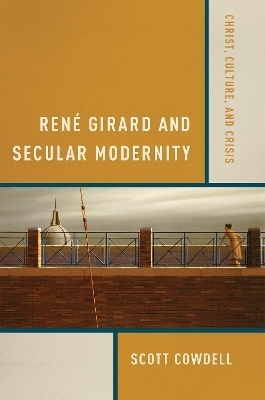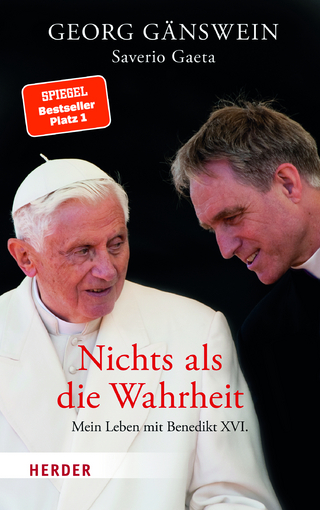
René Girard and Secular Modernity
Christ, Culture, and Crisis
Seiten
2024
University of Notre Dame Press (Verlag)
978-0-268-21011-3 (ISBN)
University of Notre Dame Press (Verlag)
978-0-268-21011-3 (ISBN)
- Lieferbar (Termin unbekannt)
- Versandkostenfrei innerhalb Deutschlands
- Auch auf Rechnung
- Verfügbarkeit in der Filiale vor Ort prüfen
- Artikel merken
In René Girard and Secular Modernity, Scott Cowdell provides the first systematic interpretation of René Girard’s controversial approach to secular modernity.
In René Girard and Secular Modernity: Christ, Culture, and Crisis, Scott Cowdell provides the first systematic interpretation of René Girard’s controversial approach to secular modernity. Cowdell identifies the scope, development, and implications of Girard’s thought, the centrality of Christ in Girard's thinking, and, in particular, Girard's distinctive take on the uniqueness and finality of Christ in terms of his impact on Western culture. In Girard’s singular vision, according to Cowdell, secular modernity has emerged thanks to the Bible’s exposure of the cathartic violence that is at the root of religious prohibitions, myths, and rituals. In the literature, the psychology, and most recently the military history of modernity, Girard discerns a consistent slide into an apocalypse that challenges modern ideas of romanticism, individualism, and progressivism.
In the first three chapters, Cowdell examines the three elements of Girard’s basic intellectual vision (mimesis, sacrifice, biblical hermeneutics) and brings this vision to a constructive interpretation of “secularization” and “modernity,” as these terms are understood in the broadest sense today. Chapter 4 focuses on modern institutions, chiefly the nation state and the market, that function to restrain the outbreak of violence. And finally, Cowdell discusses the apocalyptic dimension of Girard's theory in relation to modern warfare and terrorism. Here, Cowdell engages with the most recent writings of Girard (particularly his Battling to the End) and applies them to further conversations in cultural theology, political science, and philosophy. Cowdell takes up and extends Girard’s own warning concerning an alternative to a future apocalypse: “What sort of conversion must humans undergo, before it is too late?”
In René Girard and Secular Modernity: Christ, Culture, and Crisis, Scott Cowdell provides the first systematic interpretation of René Girard’s controversial approach to secular modernity. Cowdell identifies the scope, development, and implications of Girard’s thought, the centrality of Christ in Girard's thinking, and, in particular, Girard's distinctive take on the uniqueness and finality of Christ in terms of his impact on Western culture. In Girard’s singular vision, according to Cowdell, secular modernity has emerged thanks to the Bible’s exposure of the cathartic violence that is at the root of religious prohibitions, myths, and rituals. In the literature, the psychology, and most recently the military history of modernity, Girard discerns a consistent slide into an apocalypse that challenges modern ideas of romanticism, individualism, and progressivism.
In the first three chapters, Cowdell examines the three elements of Girard’s basic intellectual vision (mimesis, sacrifice, biblical hermeneutics) and brings this vision to a constructive interpretation of “secularization” and “modernity,” as these terms are understood in the broadest sense today. Chapter 4 focuses on modern institutions, chiefly the nation state and the market, that function to restrain the outbreak of violence. And finally, Cowdell discusses the apocalyptic dimension of Girard's theory in relation to modern warfare and terrorism. Here, Cowdell engages with the most recent writings of Girard (particularly his Battling to the End) and applies them to further conversations in cultural theology, political science, and philosophy. Cowdell takes up and extends Girard’s own warning concerning an alternative to a future apocalypse: “What sort of conversion must humans undergo, before it is too late?”
Scott Cowdell is associate professor and research fellow in public and contextual theology at Charles Sturt University, Canberra, Australia, and canon theologian of the Canberra-Goulburn Anglican Diocese. He is author and editor of a number of books, including Violence, Desire, and the Sacred: Girard's Mimetic Theory Across the Disciplines (edited with Chris Fleming and Joel Hodge).
Acknowledgements
Introduction
1. Overture to Mimetic Theory
2. From Violence to Divinity
3. From Hominization to Apocalypse
4. Girard Among the Theologians
5. A Divine-Human Drama
6. The Shadow Side of Finitude
7. Divine Overaccepting
8. Christ, the Nonviolence of God
Conclusion
Bibliography
Index
| Erscheinungsdatum | 23.10.2024 |
|---|---|
| Verlagsort | Notre Dame IN |
| Sprache | englisch |
| Maße | 152 x 229 mm |
| Themenwelt | Geisteswissenschaften ► Philosophie |
| Religion / Theologie ► Christentum ► Kirchengeschichte | |
| ISBN-10 | 0-268-21011-X / 026821011X |
| ISBN-13 | 978-0-268-21011-3 / 9780268210113 |
| Zustand | Neuware |
| Informationen gemäß Produktsicherheitsverordnung (GPSR) | |
| Haben Sie eine Frage zum Produkt? |
Mehr entdecken
aus dem Bereich
aus dem Bereich
von Athanasius bis Gregor dem Großen
Buch | Softcover (2024)
C.H.Beck (Verlag)
12,00 €


